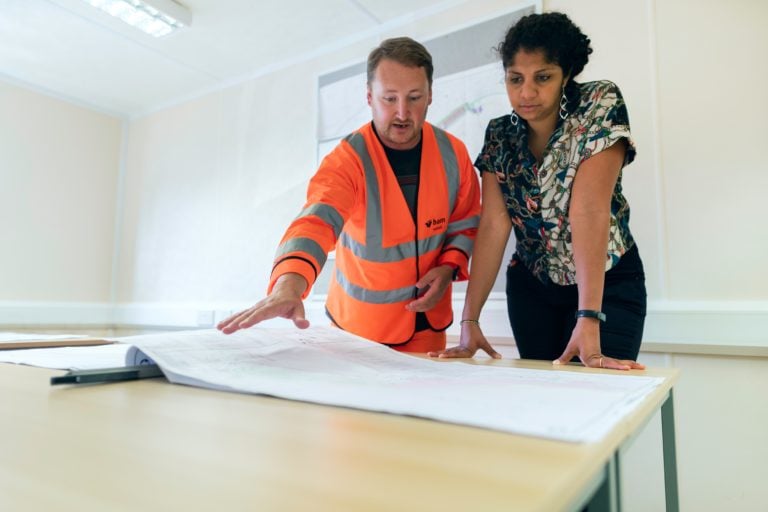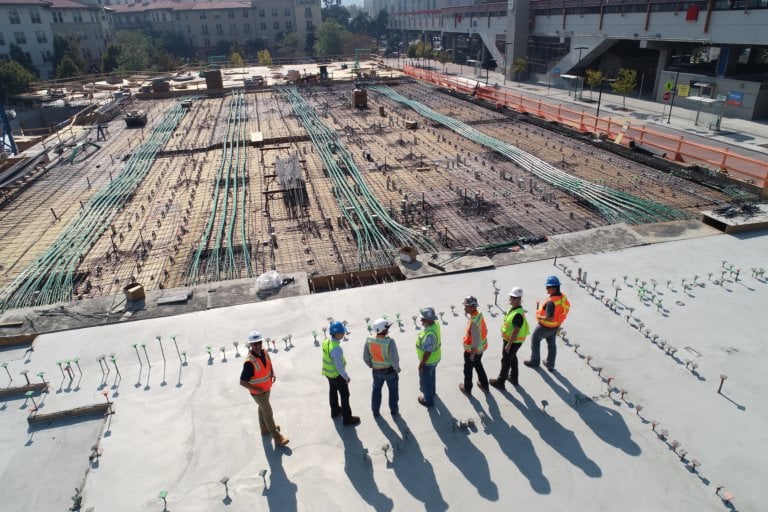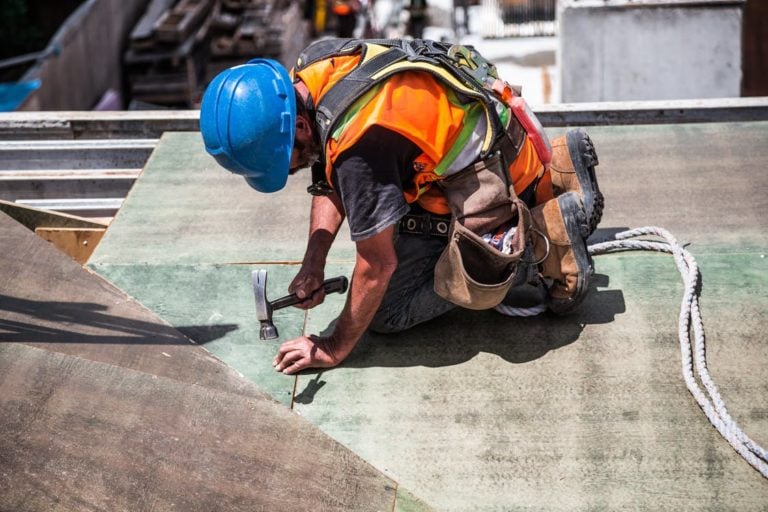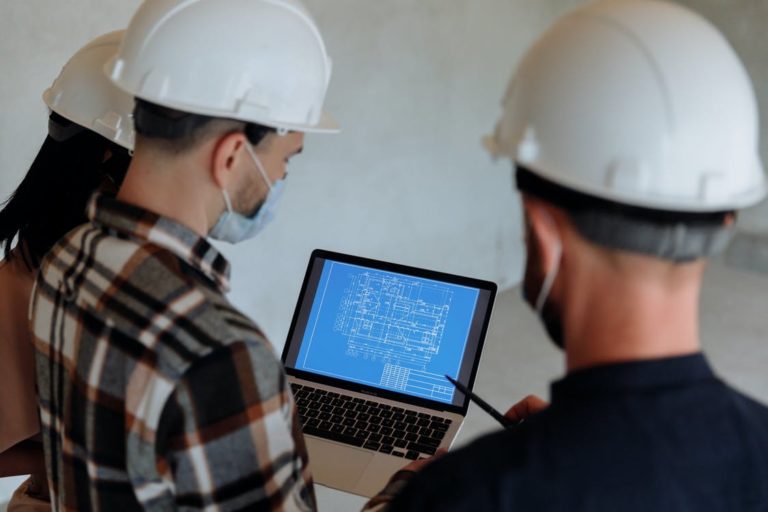Efficiently run your construction business and each project by fully understanding all of the general contractor responsibilities in this detailed guide.
On a construction site, there is perhaps no more important person than the contractor.
The contractor is more or less akin to the quarterback of a football team.
While it’s a team effort, the quarterback is going to make the biggest difference in a team winning or losing. It’s a similar situation with a contractor, who will go a long way toward determining whether the project is ultimately a success.
But exactly what does a contractor do, and what are the roles and responsibilities of a contractor on a construction site? For anyone in the construction industry, it’s important to clear up these matters.
After all, it’s crucial for there to be a division of labor on a construction site with everybody pulling their weight and playing their role to make sure everything gets done in a timely fashion.
However, since the contractor is the most important person, let’s go over the roles and responsibilities of the contractor on a construction site.
Planning
General contractor responsibilities typically begin long before anybody steps foot on a construction site.
The contractor first has to plan out the entire project.
Typically, they will put together a master schedule that includes everything that has to get done, the time frame in which to get it done, and the budget.
- The contractor has to lay out the details of the project to plan ahead when it comes to the materials and equipment needed.
- The planning stage will also take into account any legal or regulatory standards that have to be met during the project, as well as any possible hurdles that could delay progress.
- Of course, the budget might be the most important factor the contractor has to take into account during the planning stages.
Everything that’s laid out needs to fit the budget that all parties involved have agreed to for the project. If the plan doesn’t fit the budget, then the plan is insufficient, and the project can’t begin.
Refer to a project management guide to help get started.
Or, if you’re considering starting a construction company, check out our guide to ensure success from day one.
Purchase Supplies
The roles and responsibilities of a contractor will typically include purchasing the supplies and equipment needed for the project.
After all, the contractor will have already put together the details of what’s needed during the planning stage. But it’s not just about getting the right materials.
The contractor has to decide on the quality of the materials that are being used while also ensuring that the materials can arrive at the site by the time they’re needed.
Needless to say, the budget will play a role in these types of decisions made by the contractor because it’s rarely possible to find the highest-quality materials for every part of the project.
Regulatory Requirements
It’s amazing the amount of boring busywork that’s required on a construction project. Naturally, these fall under the general contractor responsibilities. Somewhere between planning the project and getting work underway, the contractor has to acquire all of the licenses and permits that will be needed somewhere along the way to complete the project.
There are also local or state building codes that must be taken into account beforehand and followed closely during the construction process.

If the contractor doesn’t take all of the permits and legal requirements for a project, work can be disrupted and the entire project put on hold, which is the biggest nightmare of every client and contractor.
Management
What does a contractor do once the project gets underway? The contractor will be responsible for monitoring and managing the day-to-day operations on the construction site. This will involve making sure the crew is productive and completing the necessary work in a timely manner.
As mentioned, the contractor has already written up the plans, so it should be easy to recognize when things are falling behind.
- If there are problems with the equipment, materials, sub-contractors, payments, or any other details of the project, the contractor will have to find the solution.
- If there is a fire to be put out (hopefully, a figurative one), it’s the contractor who has to put it out and do whatever is required on a daily basis to keep the project on schedule.
Scale Your Construction Company With Connecteam
Own your general contractor responsibilities and grow your business with the leading construction app, Connecteam.
Bring The Players Together
An important part of a contractor’s responsibilities is making sure everyone who’s contributing to the project is on the same page and well-positioned to do their part.
- This means bringing in subcontractors at the right time to practice their specialty.
- That means painters, plumbers, electricians, and other workers who won’t be on-site full-time but will be needed at some point.
Much like a quarterback, part of the job is making sure everyone else is lined up properly and ready to do their job when called upon. Especially when it comes to engaging your crew to lower turnover rates (which is high in this industry).
Needless to say, it can be challenging to coordinate the timing of subcontractors in addition to finding the right person for the job, which is why the contractor is so important on a construction site.
Time Tracking
The roles and responsibilities of a contractor also include tracking the entire project to make sure that it is set to finish on time and that all of the work performed is done correctly.
This is a little different from managing the day-to-day details of a project and making sure any issues that pop up are handled appropriately.
Project tracking involves monitoring quality control to ensure the owner is getting their money’s worth. It also means being able to make adjustments to help the crew catch up if the project falls behind schedule. Naturally, this also relates back to the budget.
The contractor always needs to be aware of the money being spent.
- Is there enough money left in the budget to finish what needs to be accomplished?
- If not, how can some money be saved to get the budget on track?
In other words, the contractor must look at the entire scope of the project and ensure that everything is going more or less according to plan.
Consider construction time tracking software to get the job done.
Speak With The Client
What does a contractor do when they’re not monitoring crew members and the budget? There’s a good chance that they’re speaking with the client and providing updates.
The contractor will typically be the point of contact for the client, answering any questions the client might have and letting them know about all of the important details about what’s going on.
After all, the contractor is monitoring just about everything that goes on, so they will know everything that the client needs to know. How closely the client will be involved can vary, but no matter how involved or not involved they are, all of their information will typically come from the contractor.
Monitor Health And Safety
While it’s easy to say that getting the project done on time and budget is the most important thing, there is actually nothing more important on a construction site than the health and safety of everyone working there.
So, what does a contractor do to monitor health and safety on the worksite?
Ultimately, the contractor is responsible for the health and safety of everyone who sets foot on the site. That means making sure the workers have the proper safety equipment and have been properly trained to protect themselves from all of the hazards at the construction site.
Be sure to hold construction toolbox meetings to discuss safety topics. And hold pre-construction meetings as well.
Hopefully, there is a safety officer on-site to help monitor this part of the job for the contractor. But there is still a lot of work and management to be done on the part of the contractor to keep tabs on workplace safety.
Own General Contractor Responsibilities With A Mobile App
At the end of the day, the list of general contractor responsibilities only grows. And it can get really hard to keep track of each and every role and responsibility of a contractor.
So what does a contractor do when managing everything gets to be overwhelming? They turn to construction management apps! After all, it’s the 21st century and it is the way forward. The leading construction management app contractors go to is Connecteam.
The key features Connecteam has that make general contractor responsibilities easier include:
- Digital checklists, forms and reports automate day-to-day tasks, processes and operational procedures. From the field, your crew can fill out safety checklists, hazard reports, site opening checklist, etc. right from their mobile phone.
- Quickly schedule shifts for an individual or team. Dispatch jobs for your on-site employees, include shift information like tasks, address information, manager notes, etc.
- Use employee time tracking software to track work hours and measure time spent on jobs and projects. Plus, timesheets are more accurate with GPS time tracking. Also Connecteam’s integration with QuickBooks Online and Gusto ensures 100% accurate and smooth payroll.
- Keep your crew on the same page and engaged with 1:1 or group chat, company updates, a social feed, surveys, live polls, and more.
- Enhance onboarding and training with quizzes, a digital library to store all materials, PDF files, links, videos, and more.
Stay on top of your general contractor responsibilities and grow your business with Connecteam.
Scale Your Construction Company With Connecteam
The Final Product Of General Contractor Responsibilities
When all is said and done, the general contractor responsibilities also extend to other avenues. For example:
- What does the final product look like?
- How much does it cost?
- Is the quality of the final product to the liking of the client?
- Is there a deficit in the budget?
- Was the project finished on time?
For all of these issues, the buck stops with the contractor.
This is why there are so many general contractor responsibilities from start to finish and why they have to stay on top of every detail. So, what does a contractor do on a construction site? The short answer is just about everything.




